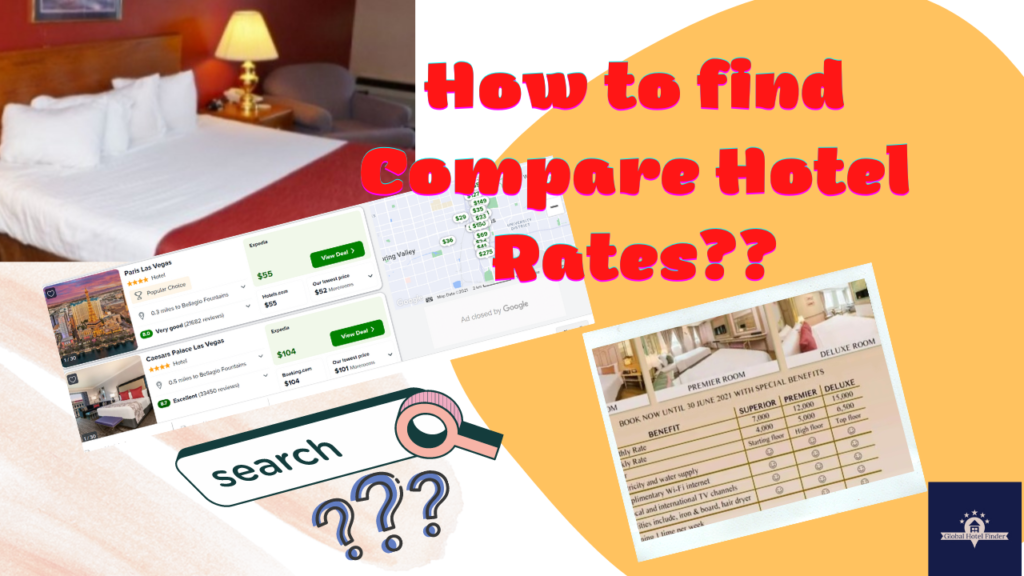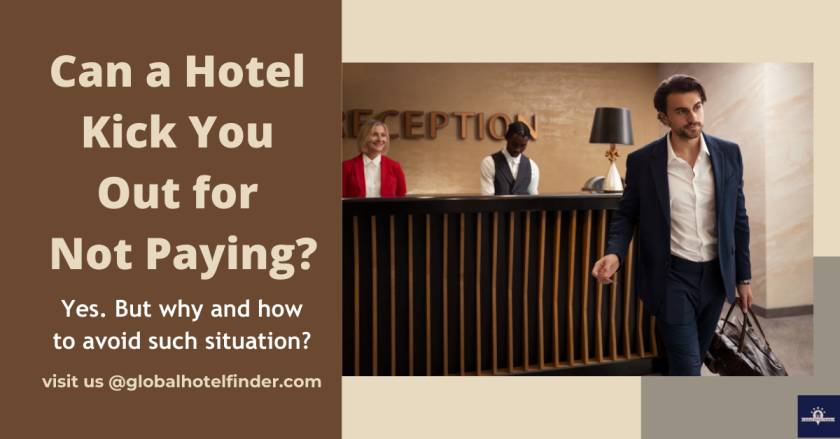After traveling a lot a luxury hotel stay can give you a pleasant experience that will make your day. What what is you forget to pay your hotel bill or can’t pay the full bill amount due to wrong wrong payment method, not having enough balance at that time, or anything else? Can a Hotel Kick You Out for Not Paying?
The answer, in short, is yes. Hotels have the right to kick out their guests who are unable to pay the bill. Because it is a breach of contract. However, there are certain procedures and laws that hotels must follow to ensure a legal eviction process.
Staying in a hotel is usually a pleasant experience, but what happens if you forget to pay your bill or can’t pay it in full? Can a hotel kick you out for not paying? Let’s dive into the world of hotel policies and find out.
Key Factors in Summary:
- Hotels may kick you out if you do not pay the bill.
- Hotels don’t do this for the first time, firstly they send you a notice to leave the hotel as soon as possible.
- You also have some right to protect yourself if a hotel kicks you out for not paying.
- You can also avoid such situations that may occur due to nonpayment issues.
Can a Motel Just Kick You Out for Non Payment?
Yes, a motel can ask a guest to leave for non-payment. However, it mainly depends on the motel’s policy and local law. So, it is a good idea to check out the motel policies before check-in and also the payment methods, along with the extra hidden fee.
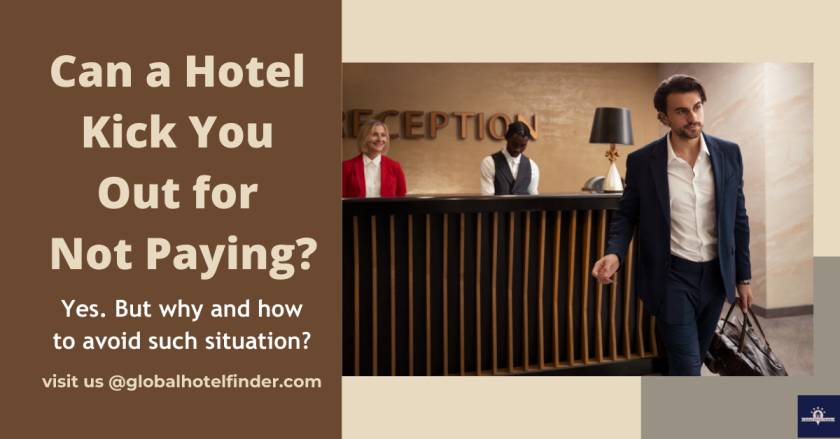
Motels directly don’t kick you out for non-payment, for the first time they send a notice to guests who can’t pay the bill. Always check the terms and local regulations to understand your rights and obligations as a guest.
John Doe, Hotel Owner Opinion
“A hotel can kick you out for not paying. It’s a matter of contract law. When you check into a hotel, you agree to pay for the room and services. If you don’t, the hotel has the right to evict you. It’s not a personal thing, it’s just business.”
What is the Legal Process for a Hotel to Evict a Guest Who Refuses to Pay Their Bill?
Initial notification and grace period
If you find yourself in a situation where you cannot pay your hotel bill, the first step in the eviction process is typically an initial notification to hotel management. This notice serves as a reminder and may provide a grace period, typically between 24 and 72 hours, to pay outstanding fees.
During this time, the hotel staff may try to contact you several times to resolve the issue amicably.
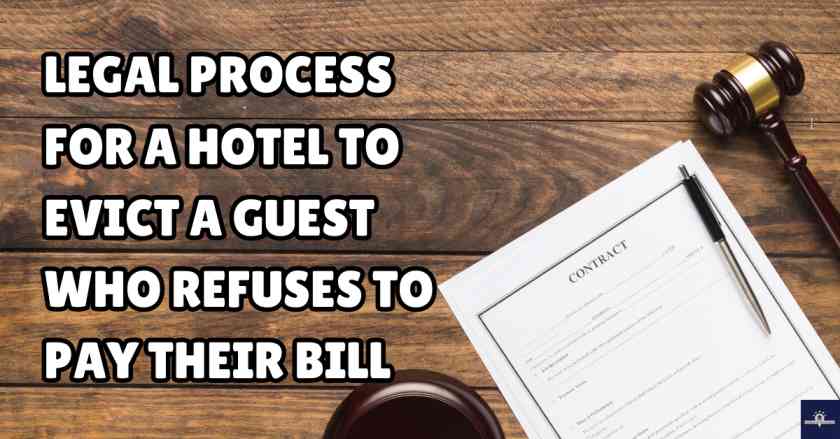
Formal eviction notice and deadlines
If the grace period passes without payment or resolution, the hotel will likely issue a formal eviction notice. This notice will usually specify the exact deadline for vacating the premises, which is usually between 24 and 48 hours.
The notice may also describe the legal consequences of non-compliance, such as possible involvement of law enforcement authorities or legal proceedings. It is important to take this warning seriously as ignoring it could worsen the situation and potentially have more serious consequences.
Involvement of police authorities or court orders
If you still do not comply with the formal eviction notice and deadlines, the hotel may contact the authorities or obtain a court order to evict you from the premises. This step is usually a last resort and is taken when all other attempts at resolution have failed.
Police officers may physically escort you off the property and face legal consequences such as a report of trespassing or fines.
It is important to note that the specific eviction process and timelines may vary depending on the laws of the state or local jurisdiction in which the hotel is located. Some states have stricter rules or additional requirements for evicting guests. Therefore, it is always advisable to familiarize yourself with local laws and seek legal advice if necessary.
By understanding the eviction process and taking proactive steps to communicate with hotel staff, you can avoid escalation and find a mutually acceptable solution.
Jane Smith, Hotel Owner Opinion
“In my experience, it’s not uncommon for guests to have financial difficulties that prevent them from paying. In those cases, we work with the guest to find a solution. But if a guest refuses to pay or communicate with us, then we have no choice but to evict them.”
Legal Aspects of Hotel Stays
There are several legal considerations surrounding hotel stays that both guests and hotel staff should be aware of. Gaining an understanding of these legal subtleties can help avoid miscommunications and conflicts, making the process go more smoothly and enjoyably for all parties.
Contractual Agreements
The contract between a hotel and a guest is usually concluded through the reservation and the provision of your payment details. By doing so, you agree to the hotel’s terms and conditions, which may include cancellation, deposit, and payment policies.
Rights and Responsibilities
The law protects the rights and obligations of both hotel employees and visitors. This covers the rights of visitors to privacy, a safe and comfortable stay, and equitable treatment. On the other hand, hotel owners are entitled to demand that visitors abide by their rules regarding behavior, payment, and the use of the hotel’s amenities.
Payment Disputes and Eviction
A payment dispute is one of the most frequent legal problems that might occur while visiting a hotel. If a guest fails to pay their hotel bill, the hotel has the right to take action to recover the debt. This can include charging the guest’s credit card on file, withholding the guest’s belongings as collateral, or even evicting the guest from the room.
Note: When planning to stay in a hotel, you have to understand the hotel policies and the payment obligations that come with booking a room. When you are checking into a hotel you are entering into a contract with the hotel. That means you are bound to pay for the services and accommodations provided to you. But if you fail to pay then you may be asked to leave the premises.
How to Protect Your Rights As A Guest? Explained
Staying in a hotel should be a pleasant and worry-free experience. However, payment disputes or other issues may arise that may cause conflict with hotel management. It is important to understand your rights and how to protect them effectively.
Here’s what you need to know:
Challenging charges and seeking solutions
If you believe the hotel has charged you an incorrect or unjustified rate, please do not hesitate to dispute the charges. First, calmly discuss the problem with the front desk staff and ask for an explanation. If the matter remains unresolved, politely ask to speak to a manager or supervisor.
The most reputable hotels will strive to provide excellent customer service and will work with you to find a reasonable solution.
Avoid illegal evictions and harassment
It is important to know your rights and stand your ground if hotel staff attempt to evict you without proper justification.
Under most state laws, a hotel cannot forcibly evict you without following due process, which generally includes providing written notice and a reasonable opportunity to resolve the problem or vacate the premises.
Seek legal advice if necessary
In extreme cases where hotel management refuses to respect your rights or engages in illegal practices, it may be necessary to seek legal assistance. Contact a local consumer protection agency or a qualified attorney who specializes in hospitality law to determine your options and possible solutions.
Don’t be afraid to take legal action if your rights have been violated, as this can help prevent similar incidents from happening to other guests in the future. Remember that hotels have a legal obligation to provide a safe and comfortable environment for their guests. Failure to do so can have serious consequences.
What Happens if a Hotel Kick You Out?
If a hotel kicks you out of the hotel premises then you may have to leave the property immediately. The eviction by the hotel may not be sudden. They must have given you prior notice. And behind the eviction, there are several reasons including non-payment, disruptive behavior, or violating hotel policies.
Always check the terms of your stay and local laws to understand your rights and any potential consequences of being evicted.
How to Avoid Non Payment Issues?
To avoid non-payment issues at a hotel or motel, follow these tips:
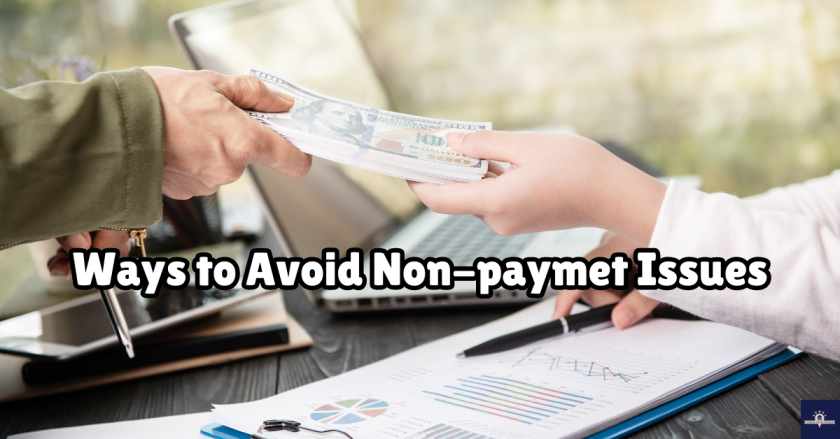
- Budget Planning: Before your stay, set a budget and allocate funds specifically for accommodations.
- Booking Confirmation: Confirm your reservation details, including rates and payment methods, to avoid surprises.
- Payment Upfront: Consider paying for your stay upfront or providing a valid credit card during check-in.
- Read Terms & Conditions: Understand cancellation policies, late fees, and other charges to avoid unexpected expenses.
- Communication: If facing financial difficulties, communicate with the hotel in advance to discuss payment arrangements or alternative solutions.
- Check Out on Time: Avoid extra charges by checking out on time and settling any additional fees before leaving.
- Keep Records: Keep receipts and transaction records as proof of payment to resolve any disputes effectively.
Michael Johnson, Hotel Owner Opinion
“I’ve had guests try to claim that they can’t pay because of some personal hardship or emergency. While I sympathize with their situation, the fact remains that the hotel has bills to pay too. If a guest can’t pay, they need to find alternative accommodations.”
Conclusion
In conclusion, if you don’t clear the hotel payment, then the hotel has the right to kick you out. But you also deserve some rights to protect yourself and we have talked about this above here. So, read the article and get to know the legal process.
Below here we have also compiled a few faqs that will resolve your queries. If you have any more queries then comment below or contact us.
FAQs on Hotel Kick You Out for Not Paying
Can hotels legally kick out guests who haven’t paid their bills, or do they need a reason?
Yes, hotels legally kick out gas who haven’t paid their bills or they do not need any other reason to do so.
Can hotel kick you out for smoking?
If a hotel’s policy is not to smoke inside the premises, and you smoke inside the premises then you may have to pay the penalty. If you don’t pay the penalty the hotel may kick you out for smoking.
Can a hotel kick you out for complaining?
No not at all a hotel can’t kick you out for complaining. If you are facing any problem then you can complain to the hotel’s front desk.
I have been staying in a hotel because I’m homeless and now I can’t pay. Can a hotel kick me out being that I’m homeless and have no money to pay?
Being homeless if you have a hotel voucher to stay free in the hotel only then you can stay in a hotel. So first collect a hotel voucher from the local government or charities and then you can stay in a hotel.
Can a hotel kick me out for no deposit after I have checked in?
Hotel deposit is a very common thing. Most of the hotels charge the deposit amount. And may ask you to leave if you can’t pay the deposit fee.
What are your rights if a hotel kicks you out?
If a hotel kicks you out, you have the right to a fair justification for the eviction, a reasonable amount of notice to leave, and the chance to make any unpaid bills whole. In addition, you have the right to get your belongings back and, if you think the eviction was unfair, you can take legal action.

